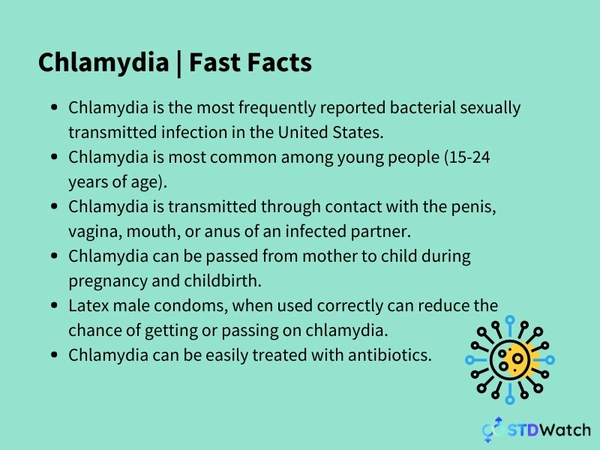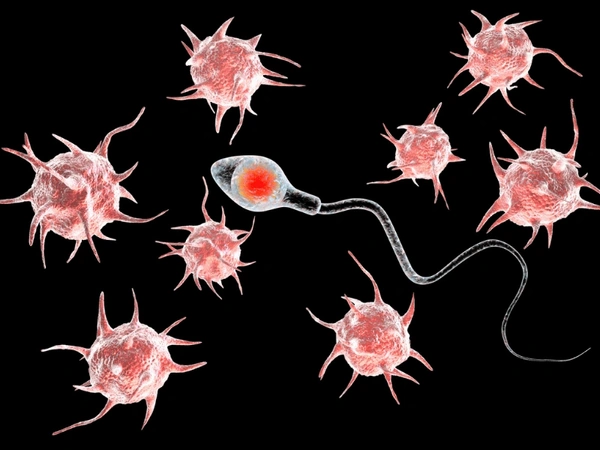- Medically reviewed by Dr Andrea Pinto Lopez, M.D.
Chlamydia is a common sexually transmitted infection. Chlamydia is one of the most common STIs in the United States. It is a bacterial infection that is caused by bacterium Chlamydia trachomatis.
It can be passed from vaginal, anal and oral sex as well as intimate genital contact (“rubbing”). Chlamydia may also be passed from mother to child during pregnancy and/or child-birth.
Usually, chlamydia has no symptoms which is why it can be spread easily and widely. Only around 10% of men and 5-30% of women who get chlamydia will ever experience any symptoms.
What is chlamydia?
Chlamydia is a common STI which usually doesn’t have any symptoms. Chlamydia can affect both male and females, but it is most common in young females.
Other people who are most likely to get chlamydia include:
- Males and females under the age of 25
- Males and females who have had chlamydia in the past
- Males and females with more than one sexual partner
- Males and females whose sexual partners have multiple partners
- Males and females who regularly use condoms
- Males and females who have a history of STIs
What happens if you have chlamydia?
Often if you have chlamydia, you will not experience any symptoms, which is why it is so important to get screened regularly, especially if you are under the age of 25 and are sexually active. Symptoms of chlamydia can include:
- Abnormal vaginal, penile, or anal discharge
- Pain during urination or intercourse
- Lower abdominal pain
- Rectal pain and/or bleeding
- Swollen pelvic lymph nodes
- Vaginal spotting after intercourse or between periods
- Painful or swollen testicles
If you are diagnosed with chlamydia, your healthcare provider will offer you a prescription for antibiotics. Usually the course of antibiotics will take 14 days to complete. It’s important to re-test before having sex again to ensure that the infection has cleared.
Untreated chlamydia can lead to serious health complications in both men and women.
Health complications of untreated chlamydia in women:
- Pelvic inflammatory disease (PID)
- Infertility caused by PID
- Chronic pelvic pain
- Tubal pregnancies
- Increased risk of contracting other sexually transmitted infections
Health complications of untreated chlamydia in men:
- Urethral infection
- Swollen and tender testicles
- Increased risk of contracting other sexually transmitted infections
What is the main cause of chlamydia?
Chlamydia is most commonly spread from person to person via unprotected sex.
Chlamydia can be passed through vaginal, anal, and oral sex. It can also be passed to the eye by a hand or other body part moistened with infected secretions. Chlamydia can be passed from a woman infected with chlamydia to her baby during delivery.
How can you get chlamydia?
- Oral sex
- Vaginal sex
- Anal sex
- Congenitally (from mother to child)
How serious is chlamydia?
Chlamydia is a very treatable sexually transmitted infection, however, if it is left untreated it can have serious consequences therefore it is so important to regularly get screened.
The Centers for Disease Control and Prevention recommend getting screened once per year.
Those who have multiple or sexual partners are recommended to get tested every 3-6 months.
- Read:How does an at home chlamydia test work?
- Read: What are the symptoms of chlamydia?
- Read: Chlamydia treatment | How do you treat chlamydia?
FAQs
I’m pregnant. How does chlamydia affect my baby?
According to the CDC, if you are pregnant and have chlamydia, you can pass the infection to your baby during delivery. This could cause an eye infection or pneumonia in your newborn. Having chlamydia may also make it more likely to deliver your baby too early.
If you are pregnant, you should get tested for chlamydia at your first prenatal visit. Testing and treatment are the best ways to prevent health problems.
Does chlamydia stay in the body after it’s been cured?
Nope! Chlamydia can be easily cured with antibiotics. Chlamydia is a bacterial infection, which means that once you’ve been treated and tested negative for it (to make sure the antibiotics worked), it’s gone. Your doctor will tell you exactly what type of antibiotics you need, and when to get tested again to make sure the antibiotics worked.
Can you test yourself for chlamydia at home?
You can now use an at home chlamydia test to identify whether or not you have chlamydia from the comfort of home. Read our top picks for at home STD tests here.
Does chlamydia have a smell?
It is quite uncommon for a person who is living with chlamydia to have any signs or symptoms, in fact 8 in 10 people who are living with chlamydia will not have any symptoms. If chlamydia has a smell, it will be more likely to affect women, via unusual smelling vaginal discharge. Men may also experience an unusual discharge coming from the tip of the penis, however it is less likely.
Can you tell if someone has chlamydia just by looking at them?
You will not be able to tell if someone has chlamydia just by looking at them. Chlamydia is known as a “silent STD”, for this reason, it is so important to get tested on a regular basis, because if chlamydia is left untreated, it can lead to further health complications such as pelvic inflammatory disorder which can affect female fertility.
What should you do if you get a positive chlamydia test result?
The good news is chlamydia can be treated easily with a course of antibiotics. If you get a positive result for chlamydia, you must not have sex until the infection has been cleared via treatment. It is also essential that you reach out to previous partners and notify them so they can get tested to.
Written by Hannah Kingston on April 16, 2021
Resources
- Chlamydia - Everything you need to know - stdwatch.com
- Center for Young Women’s Health - youngwomanshealth.org
- Which STD tests should I get? - cdc.gov
- How does an at home chlamydia test work? - stdwatch.com
- What are the symptoms of chlamydia? - stdwatch.com
- Chlamydia treatment | How do you treat chlamydia? - stdwatch.com
- What is the best at home STD test? - stdwatch.com


